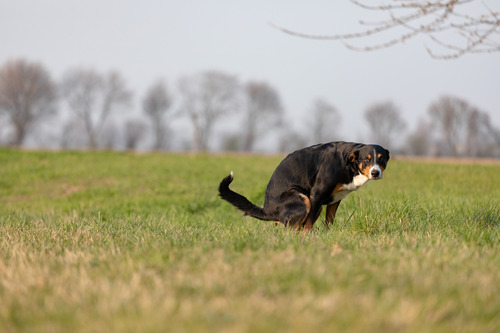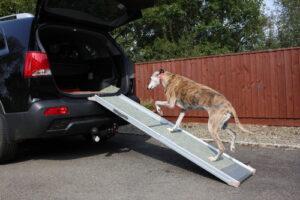Imagine you’re out and about walking your dog, when they stop to use the bathroom. Fortunately, you’ve come prepared with a disposable bag, but you notice blood in your dog’s stool. It’s natural to feel alarmed when you notice something unusual about your pet. As a concerned pet owner, your mind may race with questions and concerns. In this article, we’ll explore some common reasons why your dog might be pooping blood, what you can do about it, and when it’s time to seek veterinary care at Laurel Veterinary Clinic in Broomfield, CO.
What Is Causing Blood in Your Dog’s Stool?
Blood in your dog’s stool, also known as hematochezia or melena, can stem from various health issues. Let’s dive into some common reasons behind this concerning symptom.
1. Gastrointestinal Infections
Bacterial, viral, or parasitic infections can irritate the lining of the intestines, leading to inflammation and bleeding. Symptoms often include diarrhea, vomiting, and abdominal pain.
Types of Infections
- Bacterial Infections: Salmonella, E. coli, and Campylobacter are some bacteria that can cause bloody diarrhea in dogs.
- Viral Infections: Parvovirus is a highly contagious virus that can cause severe bloody diarrhea, especially in puppies.
- Parasitic Infections: Parasites like hookworms or whipworms can damage the intestinal lining, leading to blood in the stool.
If you suspect an infection, contact Laurel Veterinary Clinic at (303) 469-5363 for an appointment. Early diagnosis and treatment can prevent complications and improve your dog’s prognosis.
2. Dietary Indiscretion or Food Intolerance
Dogs are known for eating things they shouldn’t, and this can lead to gastrointestinal upset. Consuming spoiled food, foreign objects, or toxic substances can irritate the digestive tract, causing inflammation and bleeding. Additionally, some dogs have food intolerances or allergies that can lead to chronic inflammation and blood in their stool.
Symptoms and Management
- Vomiting and Diarrhea: These are common symptoms associated with dietary indiscretion.
- Abdominal Pain: Your dog may show signs of discomfort or bloating.
- Avoiding Certain Foods: If your dog has a known food intolerance, eliminating the offending ingredient from their diet can prevent future issues.
If your dog has eaten something inappropriate or you suspect a food allergy, schedule a visit to Laurel Veterinary Clinic.
3. Stress-Induced Colitis
Sudden changes in routine, loud noises, or anxiety-inducing events can lead to stress-induced colitis, which is inflammation of the colon. Colitis often results in bloody diarrhea, especially if the stress is prolonged.
Identifying Stress Triggers
- Environmental Changes: Moving to a new home or the arrival of a new pet can stress your dog.
- Separation Anxiety: Being left alone for extended periods can cause anxiety.
- Loud Noises: Thunderstorms, fireworks, or construction noise can trigger stress.
If you notice blood in your dog’s stool following a stressful event, contact Laurel Veterinary Clinic to schedule an appointment so our team can help manage your dog’s stress and ensure their digestive health.
4. Inflammatory Bowel Disease (IBD)
Inflammatory Bowel Disease (IBD) is a chronic condition that causes inflammation in the gastrointestinal tract. Dogs with IBD may have intermittent diarrhea, vomiting, and blood in their stool. The exact cause of IBD is often unknown, but it may be linked to genetics, diet, or an abnormal immune response.
Long-Term Management
- Dietary Changes: A hypoallergenic diet may help manage symptoms.
- Medications: Anti-inflammatory drugs or immunosuppressants may be prescribed.
- Regular Monitoring: Ongoing veterinary care is crucial for dogs with IBD to manage flare-ups and maintain quality of life.
If your dog has been diagnosed with IBD or you suspect it may be the cause of their symptoms, you’ll need to work closely with your veterinarian to develop an effective management plan.
5. Presence of Tumors or Polyps
In some cases, blood in your dog’s stool may be due to tumors or polyps in the gastrointestinal tract. These growths can cause bleeding, especially if they are located in the colon or rectum. While not all tumors are cancerous, have any abnormal growths evaluated by a veterinarian.
Potential Signs of Tumors or Polyps
- Chronic Diarrhea: Persistent diarrhea that does not respond to treatment may indicate a more serious underlying issue.
- Weight Loss: Unexplained weight loss can accompany gastrointestinal tumors.
- Changes in Appetite: A loss of appetite or difficulty eating may also be a sign.
If your dog exhibits these symptoms, schedule an appointment with Laurel Veterinary Clinic for a thorough examination and appropriate diagnostics.
When Should I Bring My Dog to the Vet?
If your dog is pooping blood, there are ways to determine whether immediate veterinary attention is necessary. Some situations require urgent care, while others may be managed with a scheduled visit.
Signs That Warrant Immediate Veterinary Attention
- Large amounts of blood in the stool
- Accompanying symptoms such as severe vomiting, weakness, or collapse
- Blood in the stool of young puppies, as they are more vulnerable to infections like parvovirus.
Managing Less Severe Cases
A few streaks of blood or if your dog seems otherwise healthy and active may not be an emergency, but still warrant a veterinary consultation. In any case, it’s always best to err on the side of caution. Call Laurel Veterinary Clinic at (303) 469-5363 or request an appointment to discuss your dog’s symptoms with a professional.
How to Support Your Dog’s Recovery
While it’s necessary to have a veterinarian address the underlying cause of blood in your dog’s stool, there are steps you can take to support your dog’s recovery and overall well-being.
Follow the Vet’s Recommendations
Once your veterinarian has diagnosed the issue, they will provide a treatment plan tailored to your dog’s needs. Follow these instructions carefully to ensure your dog’s recovery.
Provide a Stress-Free Environment
Reducing stress in your dog’s environment can promote healing, especially if stress-induced colitis is the cause. Create a calm, predictable routine and provide plenty of comfort and reassurance.
Monitor Your Dog’s Diet
If dietary indiscretion or food intolerance is the issue, keep a close eye on what your dog eats. Offer a balanced diet recommended by your veterinarian to prevent further digestive upset.
Seeing blood in your dog’s stool is understandably concerning, but with prompt veterinary care and careful management, your dog can recover and return to their happy, healthy self. Contact Laurel Veterinary Clinic at (303) 469-5363 if you have any concerns about your dog’s health.





